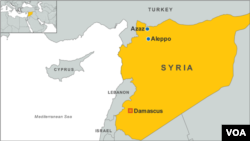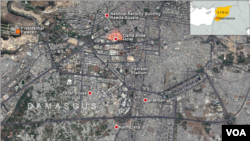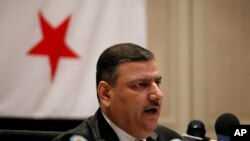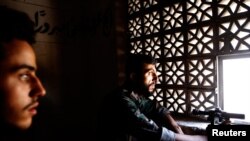A Syrian warplane bombarded the rebel-controlled northern border town of Azaz on Wednesday, leaving scores wounded and several dozen dead, according to a VOA reporter on the scene.
VOA correspondent Scott Bobb was interviewing a local rebel commander when a bomb dropped by a Syrian Air Force MiG fighter hit three blocks away.
"It blew the windows out of the office during the interview, everyone evacuated," Bobb said. "A few minutes later, it appeared that the same MiG made a second pass and dropped another bomb."
The Syrian Observatory for Human Rights said at least 20 people were killed. Reuters reported that one activist said at least 30 bodies had been found and that the death toll is mounting, making it one of the deadliest government attacks in the nearly 18-month-long uprising.
Bobb reports that residents scurried to free the injured and collect the dead amid collapsed buildings.
"We are told that there are dozens dead in the city and probably many more wounded to varying degrees," Bobb said. "The citizens are panicking. Many have just jumped into whatever vehicle they have - cars, tractors, motorcycles - and headed away from the town with the fear that this may be the beginning of an offensive, though so far, it appears to just be a one-shot deal."
"The first bomb we are told hit near the central market," he said from the border area. "The second hit near the hospital. We witnessed wounded coming across, one man was clearly dead having received shrapnel through the chest, others were lightly wounded but were going to Turkey for treatment."
"I have seen dozens of people fleeing, often families, sometimes three or four on a motorcycle," Bobb said. "I saw one family of about six on a farm tractor crossing through a rural road, an olive tree field, and others have come through in ambulances, pickup trucks, civilian vehicles, cars."
Azaz has been in rebel control for weeks and was not a government target until Wednesday, Bobb said.
"This town had been held by the Free Syrian Army for some time," Bobb said. "It was fairly stable and many of the refugees had returned. Locals say it was the first bombing they have experienced...This may have been something to rattle the population, it may have been a warning."
Damascus Bombing
The aerial assault came after a massive bomb exploded Wednesday in a parking lot outside a hotel used by United Nations observers in the Syrian capital, causing injuries but not harming international monitors.
Syrian state TV reported that the bomb, which ignited a nearby fuel truck, went off near the Dama Rose hotel and military buildings in Damascus. The blast wounded at least three people, but Syria's deputy foreign minister, Faisal Mekdad, said none of the U.N. monitors were affected.
Mekdad said the choice of location for the blast indicates the "heinous intentions" of those responsible - a veiled reference to insurgents fighting to oust the government of Bashar al-Assad.
"This is terrorism," Mekdad said. "It should be stopped. The international community must work hand in hand against terrorism. Once it hits here, near the United Nations observers, it can hit everywhere."
The rebel Syrian Free Army claimed responsibility, but said it was targeting the Syrian military and not U.N. observers. An FSA spokesman said the group had learned specifically of a large meeting of officers.
But Khattar Abou Diab, who teaches political science at the University of Paris, says a coordinated attack would be a very complicated operation for rebels to pull off as the area is likely to be heavily guarded.
Absent of a major betrayal by officers inside the Syrian military, Abou Diab says it's almost impossible for outside groups to enter the secure military compound enclave.
And while Abou Diab questions the veracity of the FSA claim, he says that the blast is yet another sign that the Syrian regime is weakening.
The Syrian capital has seen a wave of bombings recently. This latest incident comes four weeks after an explosion at the National Security building in Damascus killed several of Assad's top security officials.
The capital has seen fierce clashes between government forces and rebels in recent weeks, after being the scene of relative calm throughout much of the nearly 18-month-long uprising against Assad.
The Syrian attacks have also overflowed into Lebanon.
Lebanese state television said at least 20 Syrians were kidnapped inside Lebanese territory Wednesday, and gunmen are terrorizing the streets of Beirut.
World Weighs Options
The U.N. Security Council is due to discuss the situation in Syria on Thursday, days before the observer mission's mandate expires on August 19. The mission has already significantly scaled down from its peak of more than 300 monitors.
U.N. investigators said Wednesday the Syrian government and their militia allies have committed war crimes that include the killing and torturing of civilians. The investigators said rebel forces have also committed war crimes, but that these crimes "did not reach the gravity, frequency and scale" of those committed by the government.
China's official People's Daily newspaper on Wednesday criticized Western nations for talking about the prospect of a no-fly zone of Syria, saying such comments undermine U.N. mediation efforts and harm the unity of the Security Council.
The paper also reiterated China's commitment to a diplomatic solution to the crisis. China has joined Russia in vetoing U.N. Security Council resolutions threatening Syria with sanctions for using heavy weapons against civilians.
Foreign ministers of the 57-member Organization of Islamic Cooperation agreed during a summit in Mecca to recommend suspending Syria from the group. But the foreign minister of Iran - one of Syria's strongest allies - said his country will never accept the proposal.
No-Fly Zone Discussed
U.S. Secretary of Defense Leon Panetta said earlier this week he is confident the United States could enforce a no-fly zone, but that it is not a top priority.
"We have planned for a number of contingencies that could take place and one of those possible contingencies is developing a no-fly zone. But we've also pointed out difficulties in being able to implement that," Panetta said. "It's not on the front burner as far as I know."
He also says Iran is trying to develop and train a militia in Syria to fight rebels on behalf of Assad's government.
Last year, the U.S. and its NATO allies implemented a no-fly zone over Libya as rebels fought against and eventually ousted leader Moammar Gadhafi. But the circumstances are different in Syria, which has much more sophisticated air defenses than Libya.
President Assad's forces have increased air attacks in recent weeks, targeting rebel strongholds in key places such as the nation's largest city of Aleppo.
Syrian rebels have said they need a no-fly zone to protect against the attacks.
Government Struggling
Former Syrian prime minister Riad Hijab appeared publicly Tuesday for the first time since his defection, calling President Bashar al-Assad's government an "enemy of God" and saying it is collapsing.
In a news conference in the Jordanian capital Amman, Hijab said he defected last week from the government and joined the 17-month Syrian uprising of his own will. He said he was not dismissed from his post as Syrian authorities claimed and urged other Syrian leaders to break from the government.
The former prime minister is the highest-ranking political figure to defect from the Syrian government. He fled to Jordan with his family.
Hilal Khashan, an analyst at the American University of Beirut, says that Western supporters of the Syrian opposition, including the U.S., are trying to identify ex-members of Assad's regime who are able to form a core leadership for a new Syria.
"The U.S. is trying to identify defectors from Assad's regime as leaders of a post-Assad Syria," Khashan said. "It's clear [from] that, based on comments by Hijab today, when he said that there are good decent people in Assad's administration and that they should join the uprising."
Syrian activists say more than 20,000 people have been killed since the start of the revolt in March of last year.
VOA's Edward Yeranian contributed to this report from Cairo. Information for this report was also provided by AP, AFP and Reuters
Photo Gallery: Latest Images from Syria
VOA correspondent Scott Bobb was interviewing a local rebel commander when a bomb dropped by a Syrian Air Force MiG fighter hit three blocks away.
"It blew the windows out of the office during the interview, everyone evacuated," Bobb said. "A few minutes later, it appeared that the same MiG made a second pass and dropped another bomb."
The Syrian Observatory for Human Rights said at least 20 people were killed. Reuters reported that one activist said at least 30 bodies had been found and that the death toll is mounting, making it one of the deadliest government attacks in the nearly 18-month-long uprising.
Bobb reports that residents scurried to free the injured and collect the dead amid collapsed buildings.
"We are told that there are dozens dead in the city and probably many more wounded to varying degrees," Bobb said. "The citizens are panicking. Many have just jumped into whatever vehicle they have - cars, tractors, motorcycles - and headed away from the town with the fear that this may be the beginning of an offensive, though so far, it appears to just be a one-shot deal."
"The first bomb we are told hit near the central market," he said from the border area. "The second hit near the hospital. We witnessed wounded coming across, one man was clearly dead having received shrapnel through the chest, others were lightly wounded but were going to Turkey for treatment."
"I have seen dozens of people fleeing, often families, sometimes three or four on a motorcycle," Bobb said. "I saw one family of about six on a farm tractor crossing through a rural road, an olive tree field, and others have come through in ambulances, pickup trucks, civilian vehicles, cars."
Azaz has been in rebel control for weeks and was not a government target until Wednesday, Bobb said.
"This town had been held by the Free Syrian Army for some time," Bobb said. "It was fairly stable and many of the refugees had returned. Locals say it was the first bombing they have experienced...This may have been something to rattle the population, it may have been a warning."
Damascus Bombing
The aerial assault came after a massive bomb exploded Wednesday in a parking lot outside a hotel used by United Nations observers in the Syrian capital, causing injuries but not harming international monitors.
Syrian state TV reported that the bomb, which ignited a nearby fuel truck, went off near the Dama Rose hotel and military buildings in Damascus. The blast wounded at least three people, but Syria's deputy foreign minister, Faisal Mekdad, said none of the U.N. monitors were affected.
Mekdad said the choice of location for the blast indicates the "heinous intentions" of those responsible - a veiled reference to insurgents fighting to oust the government of Bashar al-Assad.
"This is terrorism," Mekdad said. "It should be stopped. The international community must work hand in hand against terrorism. Once it hits here, near the United Nations observers, it can hit everywhere."
The rebel Syrian Free Army claimed responsibility, but said it was targeting the Syrian military and not U.N. observers. An FSA spokesman said the group had learned specifically of a large meeting of officers.
But Khattar Abou Diab, who teaches political science at the University of Paris, says a coordinated attack would be a very complicated operation for rebels to pull off as the area is likely to be heavily guarded.
Absent of a major betrayal by officers inside the Syrian military, Abou Diab says it's almost impossible for outside groups to enter the secure military compound enclave.
And while Abou Diab questions the veracity of the FSA claim, he says that the blast is yet another sign that the Syrian regime is weakening.
The Syrian capital has seen a wave of bombings recently. This latest incident comes four weeks after an explosion at the National Security building in Damascus killed several of Assad's top security officials.
The capital has seen fierce clashes between government forces and rebels in recent weeks, after being the scene of relative calm throughout much of the nearly 18-month-long uprising against Assad.
The Syrian attacks have also overflowed into Lebanon.
Lebanese state television said at least 20 Syrians were kidnapped inside Lebanese territory Wednesday, and gunmen are terrorizing the streets of Beirut.
World Weighs Options
The U.N. Security Council is due to discuss the situation in Syria on Thursday, days before the observer mission's mandate expires on August 19. The mission has already significantly scaled down from its peak of more than 300 monitors.
U.N. investigators said Wednesday the Syrian government and their militia allies have committed war crimes that include the killing and torturing of civilians. The investigators said rebel forces have also committed war crimes, but that these crimes "did not reach the gravity, frequency and scale" of those committed by the government.
China's official People's Daily newspaper on Wednesday criticized Western nations for talking about the prospect of a no-fly zone of Syria, saying such comments undermine U.N. mediation efforts and harm the unity of the Security Council.
The paper also reiterated China's commitment to a diplomatic solution to the crisis. China has joined Russia in vetoing U.N. Security Council resolutions threatening Syria with sanctions for using heavy weapons against civilians.
Foreign ministers of the 57-member Organization of Islamic Cooperation agreed during a summit in Mecca to recommend suspending Syria from the group. But the foreign minister of Iran - one of Syria's strongest allies - said his country will never accept the proposal.
No-Fly Zone Discussed
U.S. Secretary of Defense Leon Panetta said earlier this week he is confident the United States could enforce a no-fly zone, but that it is not a top priority.
"We have planned for a number of contingencies that could take place and one of those possible contingencies is developing a no-fly zone. But we've also pointed out difficulties in being able to implement that," Panetta said. "It's not on the front burner as far as I know."
He also says Iran is trying to develop and train a militia in Syria to fight rebels on behalf of Assad's government.
Last year, the U.S. and its NATO allies implemented a no-fly zone over Libya as rebels fought against and eventually ousted leader Moammar Gadhafi. But the circumstances are different in Syria, which has much more sophisticated air defenses than Libya.
President Assad's forces have increased air attacks in recent weeks, targeting rebel strongholds in key places such as the nation's largest city of Aleppo.
Syrian rebels have said they need a no-fly zone to protect against the attacks.
Government Struggling
Former Syrian prime minister Riad Hijab appeared publicly Tuesday for the first time since his defection, calling President Bashar al-Assad's government an "enemy of God" and saying it is collapsing.
In a news conference in the Jordanian capital Amman, Hijab said he defected last week from the government and joined the 17-month Syrian uprising of his own will. He said he was not dismissed from his post as Syrian authorities claimed and urged other Syrian leaders to break from the government.
High Profile Defectors from Syria
High-Profile Defectors from Syria- Prime Minister Riad Hijab defected to Jordan on August 6, two months after taking top post.
- Nawaf Fares, Syria's ambassador to Iraq became first Syrian envoy to defect on July 11, 2012.
- Brigadier General Manaf Tlass, highest ranking military officer to abandon Syrian government on July 6, 2012.
- Colonel Hassan Hammadeh flew his MiG-21 warplane to neighboring Jordan during a June, 2012, training mission and was granted asylum.
- Imad Ghalioun, member of Syria’s parliament, left country in January, 2012, to join opposition.
- Adnan Bakkour, former attorney general of Hama, appeared in video in late August 2011 announcing he had defected.
Hilal Khashan, an analyst at the American University of Beirut, says that Western supporters of the Syrian opposition, including the U.S., are trying to identify ex-members of Assad's regime who are able to form a core leadership for a new Syria.
"The U.S. is trying to identify defectors from Assad's regime as leaders of a post-Assad Syria," Khashan said. "It's clear [from] that, based on comments by Hijab today, when he said that there are good decent people in Assad's administration and that they should join the uprising."
Syrian activists say more than 20,000 people have been killed since the start of the revolt in March of last year.
VOA's Edward Yeranian contributed to this report from Cairo. Information for this report was also provided by AP, AFP and Reuters
Photo Gallery: Latest Images from Syria








